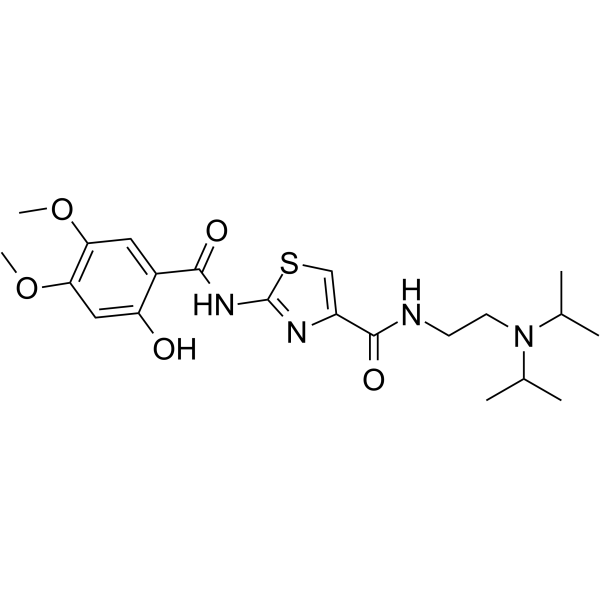185106-16-5
| Name | N-[2-[di(propan-2-yl)amino]ethyl]-2-[(2-hydroxy-4,5-dimethoxybenzoyl)amino]-1,3-thiazole-4-carboxamide |
|---|---|
| Synonyms |
Acotiamide
MZ-338 N-[2-(Diisopropylamino)ethyl]-2-[(2-hydroxy-4,5-dimethoxybenzoyl)amino]-1,3-thiazole-4-carboxamide UNII-D42OWK5383 |
| Description | Acotiamide is an orally active, selective and reversible acetylcholinesterase (AChE) inhibitor, with IC50 of 1.79 μM. Acotiamide can enhance gastric contractility and accelerate delayed gastric emptying. Acotiamide has the potential for the research of functional dyspepsia involving gastric motility dysfunction and intestinal inflammatory[1][2][3]. |
|---|---|
| Related Catalog | |
| Target |
IC50: 1.79 μM (AChE) |
| In Vitro | Acotiamide (10, 30, 100 μM; 1 hour) reduces expression levels of IκB-α phosphorylation in LPS- and MCP-1-stimulated macrophage cell lines[1]. Cell Viability Assay[1] Cell Line: NR8383, macrophage Concentration: 10, 30, 100 μM Incubation Time: 1 hour Result: Significantly reduced both TNF-α and IL-6 productions in LPS/MCP-1-stimulated NR8383 cells. |
| In Vivo | Acotiamide (0.3, 1, 3 mg/kg; i.v./3, 10, 30 mg/kg; p.o.) increases the postprandial gastric motility index in a dose-dependent manner[2]. Acotiamide (0.83 mg/kg; i.v.; once) inhibits AChE in rat stomach with IC50 of 1.79 μM[3]. Animal Model: Male mongrel dogs (9-11 kg), Male beagle dogs (9.6-12.9 kg)[2] Dosage: 0.3, 1, 3, 10, 30 mg/kg Administration: Intravenous injection; once Result: Increased the postprandial gastric motility. Animal Model: Male Sprague-Dawley rats (aged 6-7 weeks)[3] Dosage: 0.83 mg/kg Administration: Intravenous injection; once. Result: Effectively improved functional dyspepsia by inhibiting AChE in rat stomach. |
| References |
| Density | 1.2±0.1 g/cm3 |
|---|---|
| Molecular Formula | C21H30N4O5S |
| Molecular Weight | 450.552 |
| Exact Mass | 450.193695 |
| PSA | 148.24000 |
| LogP | 3.56 |
| Index of Refraction | 1.592 |
| Storage condition | -20℃ |
